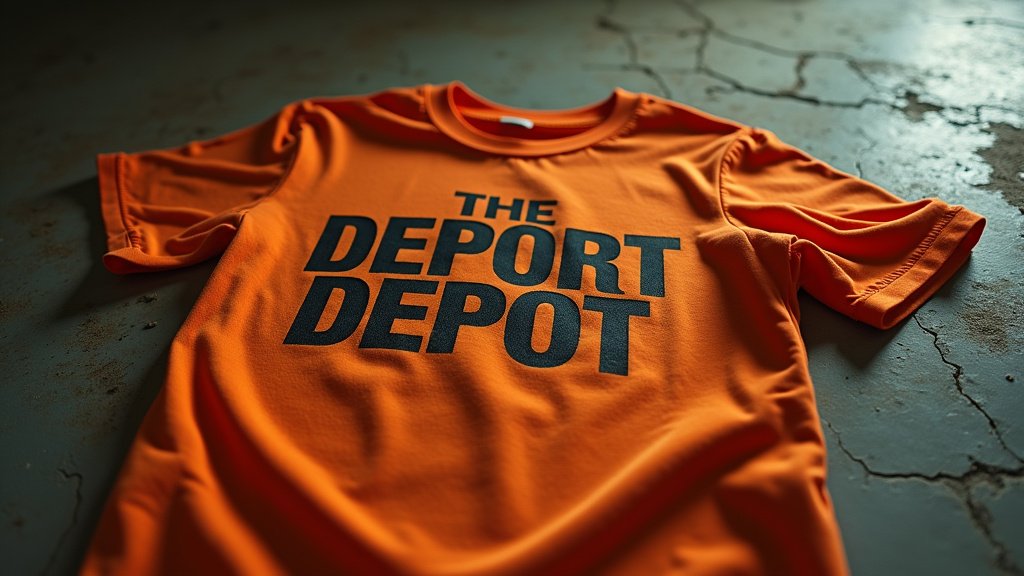In a recent turn of events that underscores the sensitive intersection of corporate branding, political messaging, and immigration policy, the Republican Party of Florida (RPOF) swiftly removed a line of immigration-themed merchandise from its online store after a forceful objection from retail giant Home Depot. The controversial items, which included shirts and hats emblazoned with the phrase “The Deport Depot,” strikingly mimicked Home Depot’s iconic orange box logo and stenciled font, drawing immediate attention and a sharp rebuke from the company.
The Unveiling and Rapid Retreat of ‘The Deport Depot’
The RPOF’s decision to launch “The Deport Depot” merchandise coincided with Florida Governor Ron DeSantis’s announcement of a new immigrant detention center by the same name. The facility, housed at the repurposed Baker Correctional Institution in Sanderson, north of Gainesville, is designed to hold up to 1,300 undocumented immigrants awaiting deportation, with potential expansion to 2,000 beds. This new “Deportation Depot” marks Florida’s second such facility, following the controversial “Alligator Alcatraz” detention center established in the Everglades earlier this summer.
The “Deport Depot” merchandise, priced between $15 and $28, was intended as a fundraising effort for the Republican Party of Florida, promoting the state’s aggressive stance on immigration. Florida GOP Chairman Evan Power initially defended the items, stating that the party’s merchandise was cleared through lawyers and he was confident that “The Deport Depot” was protected by prior case law, suggesting that “no reasonable person would think it’s the logo of a company.”
However, Home Depot quickly contradicted this stance. Home Depot spokesperson Beth Marlowe confirmed late Friday that the company had not authorized the RPOF to use its branding or logo and had reached out to the party to resolve the issue. Within hours of the story gaining traction, the items, along with a promotional post on X (formerly Twitter), were pulled from the RPOF’s website.
Florida’s Broadening Immigration Enforcement Landscape
This merchandise controversy is deeply rooted in Governor DeSantis’s ongoing efforts to solidify Florida’s position as a leader in state-level immigration enforcement. DeSantis has championed policies such as banning so-called sanctuary cities and mandating state law enforcement’s cooperation with federal Immigration and Customs Enforcement (ICE) actions. The announcement of “Deportation Depot” on Thursday was presented as a critical step in supporting federal efforts to secure the border and remove undocumented individuals.
The Baker Correctional Institution site was chosen for its “ready-made infrastructure” and proximity to Lake City airport, facilitating the processing and return of immigrants. This site was deemed a more practical and economical option compared to a previously considered location at Camp Blanding. The new facility aims to address the perceived need for increased capacity beyond the existing “Alligator Alcatraz” in South Florida, which itself has been plagued by allegations of “inhumane” conditions and is currently facing a federal lawsuit concerning its environmental impact and operational transparency.
Home Depot’s Sensitive Position in the Immigration Debate
Home Depot’s swift action against the unauthorized use of its logo is particularly notable given the company’s past and current entanglements with immigration issues. Home Depot stores nationwide have, at times, become focal points for ICE enforcement efforts targeting day laborers. This recurring presence of ICE near its stores has drawn national attention and prompted calls for the company to speak out.
Furthermore, Home Depot has a documented history of significant political contributions, with a substantial portion traditionally going to Republican candidates and causes. The company has faced boycott calls in the past due to the outspoken support for Donald Trump by its co-founder, Bernie Marcus. This context likely amplified Home Depot’s urgency in distancing itself from politically charged merchandise that could be misconstrued as an official endorsement of Florida’s immigration policies, thereby risking further public relations challenges or boycotts.
Political Fallout and Broader Implications for Miami and Current Affairs
The “Deport Depot” merchandise fiasco quickly drew criticism from Florida Democrats and immigration advocates. Orlando lawmaker Anna Eskamani condemned the merchandise as another “sad and cringy grift” and sought clarification from Home Depot’s governmental affairs representatives regarding the unauthorized logo use. Critics across the state viewed the merchandise as a cynical attempt to monetize human suffering, with Senator Shevrin Jones calling it “cruelty, politics, and profit.”
This incident highlights a continuing pattern where Florida’s Republican leaders, including Governor DeSantis, leverage aggressive immigration rhetoric and actions for political and fundraising purposes, often drawing national news coverage. The state’s efforts are seen as aligning with the broader hardline immigration agenda of former President Donald Trump.
For Miami and other South Florida communities, which are significant hubs for immigrant populations and a nexus for current affairs debates on immigration, these policies and their associated controversies have direct and profound impacts. The ongoing legal challenges to facilities like “Alligator Alcatraz” and the rapid establishment of the “Deportation Depot” continue to shape the news narrative around Florida’s approach to immigration.
In conclusion, the brief appearance and swift removal of “The Deport Depot” merchandise serve as a vivid illustration of the complexities when political campaigns cross into unauthorized commercial branding. It underscores the intensifying national debate on immigration, the political strategies employed by states like Florida, and the precarious position of corporations caught in the crossfire of such high-stakes affairs.





